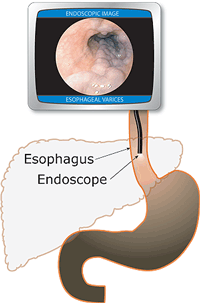for Veterans and the Public
What Will Your Health Care Provider Do About Cirrhosis? - Cirrhosis for Patients
People with cirrhosis need to see a health care provider regularly. If you have compensated cirrhosis, these visits may be scheduled as often as every 3 to 6 months. These visits allow your provider to watch for complications. Your provider may order the screening tests that can catch these complications early. Then they can be treated or even delayed.
If you have decompensated cirrhosis, you may need to see your provider more often so the complications that have developed can be managed.
An important step for all patients with cirrhosis is to reduce or prevent more liver damage by controlling the underlying cause. Patients who drink alcohol should stop all alcohol intake. It often takes support from friends, family and even a medical professional who specializes in helping individuals quit drinking. Patients with chronic viral hepatitis B or hepatitis C should receive treatment that can control or cure the virus. Patients with non-alcoholic fatty liver disease should reduce calorie intake. Consultation with a dietitian or with the MOVE! Weight Management Program is often recommended.

Some people with cirrhosis should have an upper endoscopy (pronounced “en-dahs-cup-ee”) procedure. This is a test in which a thin tube with a camera is passed down your esophagus (food tube) so that your provider can look for varices. If you have no varices, the endoscopy will be repeated every few years or you may be given a type of medication called a beta-blocker instead of endoscopy. If you have large varices, you will get treatment or medication to reduce the chance of bleeding.
You also will have a blood test and an ultrasound (or sometimes a CAT scan or an MRI) to look for signs of liver cancer and ascites. It is important for your health care provider to look for cancer on a regular basis, usually every 6 months. If the cancer is caught early, there are often ways to treat it.
If you have developed decompensated cirrhosis, your provider may discuss liver transplant with you. Your provider can answer questions and help you to decide if a transplant is right for you. Your provider will help you find out if your body can tolerate this operation, and, if it can, help you and your loved ones get ready for transplant surgery.




















